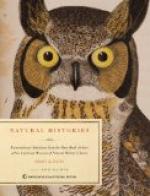and homes of others, as does also the turning under
of prairie grasses. Then, too, many of the natural
residents of primeval forests and virgin prairies
shun the sight of man, hence they gradually withdraw
from the region, and their influence for good or evil
goes with them. Since the majority of such forms
are timid and inoffensive creatures, their withdrawal
only adds that much more to the already overbalanced
conditions. Year by year the gap which at first
was scarcely noticeable becomes widened, so that frequent
inroads are made and harm results. Instead of
trying to ascertain the true cause for all this trouble
perhaps exactly the wrong thing is done by the settlers.
This of course only has the effect of further widening
the gap between safety and danger. Since an insect
or other animal becomes noticeably harmful only when
present in alarming numbers, it stands to reason that
anything which favors such an abnormal increase is
a factor in disturbing nature and should be quickly
rectified where possible. In order that these
disturbances should be looked after the all-wise God
of the universe created birds and gave them the power
of flight that they might the more readily move about
rapidly from place to place, where their services might
be needed in balancing affairs. Hence birds have
naturally and rightfully been called the “balancers”
in nature. This being true, let us see just what
their relations are to agriculture.
The farmer sows in order that he may reap an increased
measure of what he has sown. In doing this he
must first turn over the soil. This destroys
many existing plants as well as animals that depend
upon them for food. The plants thus turned down
cannot regain their position and must of necessity
die. Not so with many of the animals, however,
which soon work their way to the surface. Some
of these attack the growing plants which have been
made to occupy the place of those destroyed by the
plough. Others take wing and seek suitable food
in adjoining districts where they add to the numbers
already drawing upon the vegetation up to the point
of possible continued supply. Here, then, the
scales begin to vibrate. In the field the new
and tender crop entices the ever-shifting individuals
of myriads of forms that have been crowded out elsewhere.
The result here too is, or would be, very disastrous
were it not for the timely visit of flocks of birds
likewise in search of food.
It is during the period of first settlement of a country,
when the fields are small, few and widely separated,
that injury may and frequently does result from birds.
It is then a problem that needs careful consideration,
not only for the time being, but also for the future
welfare of that country. If animal life is destroyed
indiscriminately and without intelligent forethought,
calamities unforeseen are sure to follow in the not
distant future.




